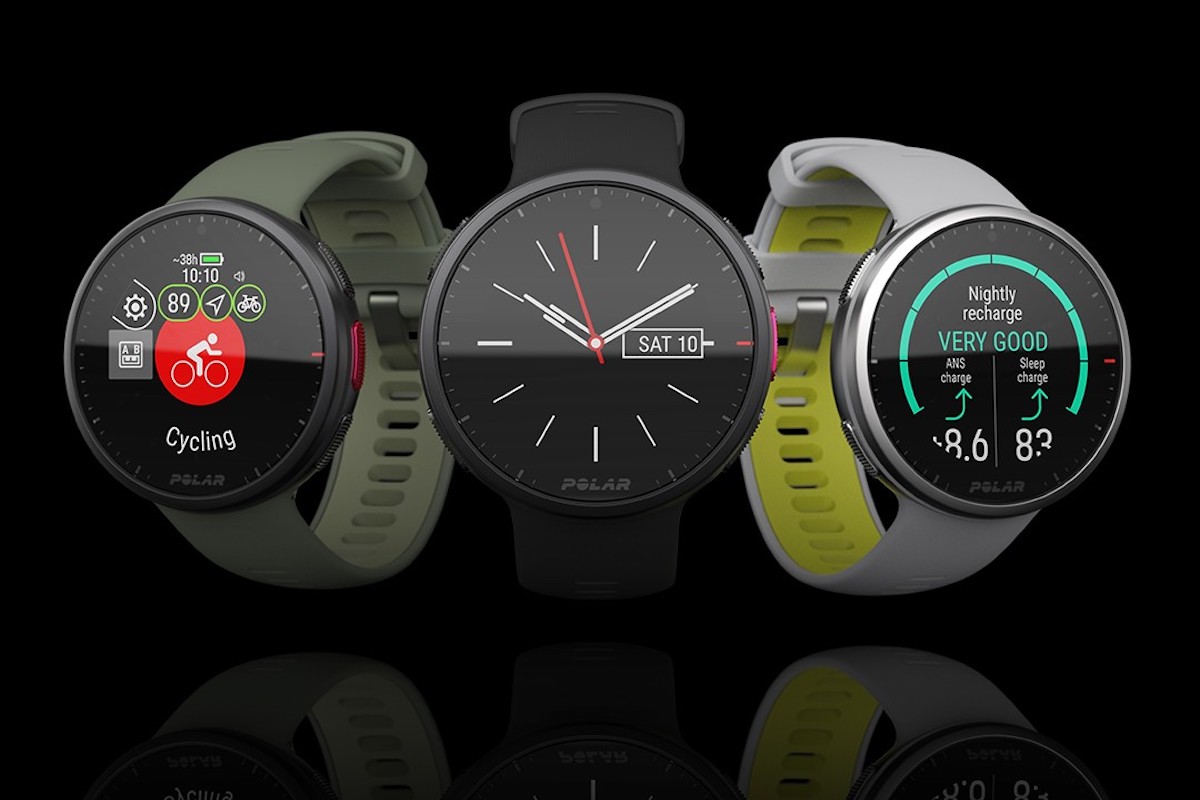
BEN: It’s been about two years since Polar introduced the Vantage lineup with the Vantage V (high end) and the Vantage M (lower-priced model). Last year they released the Grit X with additional sport modes. This update comes to the high-end offering from Polar in the Vantage V2, priced at $499.95. For an additional $50, the watch can be bundled with the Polar H10 heart rate chest strap.
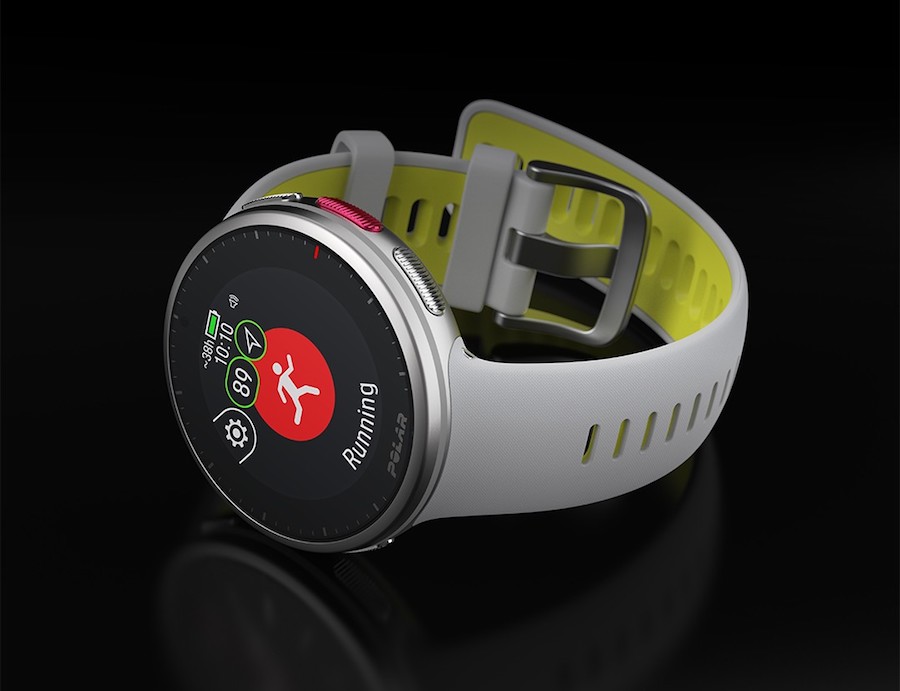
Photo courtesy of Polar
Note: Items featuring an * is new to the Vantage
BEN: The Polar Vantage V2 contains a long list of existing and new features, tests, and other ways to assess your progress. The most interesting to me is the Fitness Test (existing) and Running Performance Test (new). These metrics all use data from the HR sensor to estimate overall fitness and are related to the Fitness Index.
The Running Performance Test was one of the first things I tried out when I got the Vantage V2. It’s a structured workout that starts with a warmup and transitions automatically into the test. It starts at a pre-defined pace and requires the user to run within a defined pace range. The pace target steadily increases over time, and you must stay within the range or the test aborts. As you progress, your HR will increase and if you get above 85% you will get a test result featuring your VO2 Max. The test was somewhat challenging to complete due to the constantly changing pace target that required a lot of peeking at the watch to match. By the end, it involves running all out and feels very challenging. The test gave me a result of 66 VO2 Max.
The Running Index is a similar concept to the Running Performance Test in its use of pace vs. HR to estimate VO2 Max. This can be plotted over time and averaged. The benefit of the Running Performance Test is that it captures the full range of pace and HR with one test. Covering the full range should provide a strong correlation and accurate test result. The Running Index, however, uses the available data, so if you only ran a specific pace it will be making the estimate based on a small range. Polar Flow allows this to be plotted and tracked. With all these tests, best practice is to keep track over time and look for improvements.
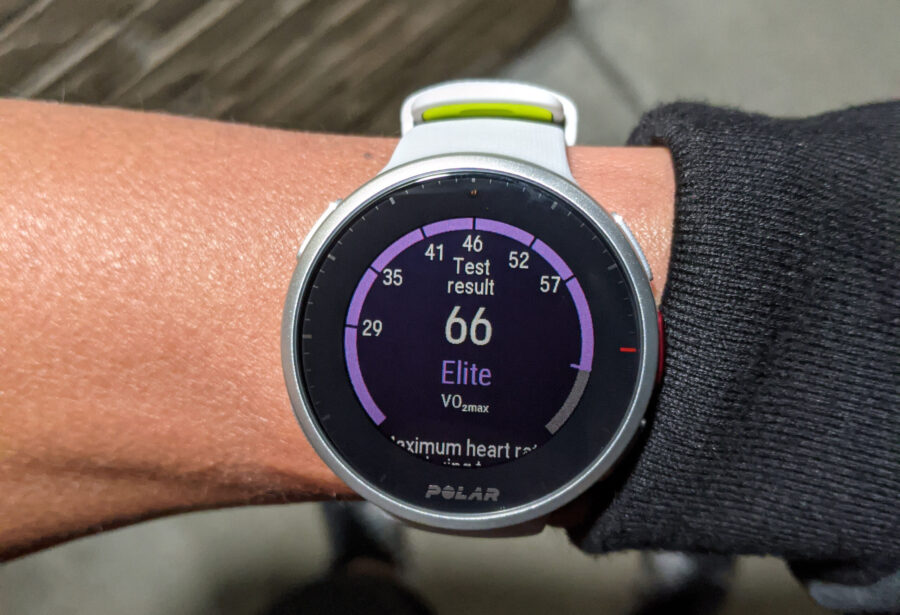 Shop Polar Vantage V2
Shop Polar Vantage V2
BEN: The Polar Flow app is useful, but the web interface really allows for in-depth and very well-presented data analytics. Just one example is this workout and the different metrics that are shown. It’s easy to see the zones (HR, pace, power) as well as the different phases of work and rest. The only minor note I have on workouts is that the interface on the watch was a bit hard to see while running in the dark due to the blue text on black background. The haptic and audible notifications were not as noticeable as I would have liked, either. There are a ton of other activity and all-day metrics that can be viewed on Polar Flow – see prior BITR Polar reviews for more info.
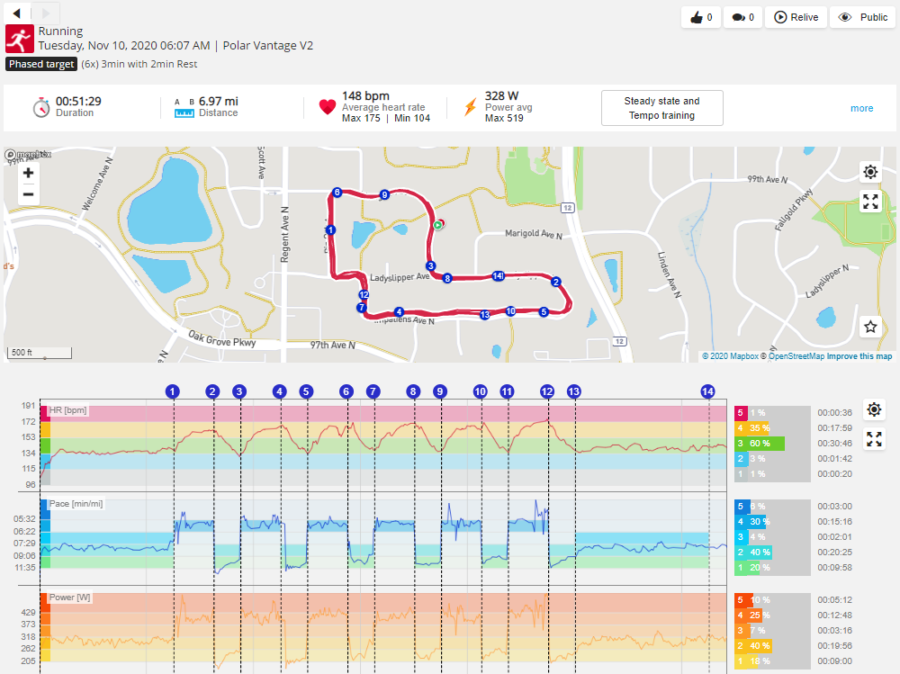
BEN: Running power has been native on Polar watches, so this is nothing new, but I have compiled data to compare with the Stryd foot pod and the COROS Pace 2 power meters. COROS and Stryd have been scaled to show approximately the same results, whereas Polar is noticeably higher. It’s worth mentioning that there is no true standard, so it’s hard to say whether any of these are right or wrong. I think all would provide a useful way to measure running power and could be effective in training and racing based on power targets. Polar has suggested that power-based workouts and a power zone pointer will be coming in future updates, but as of the time of this publication, they have not been implemented.
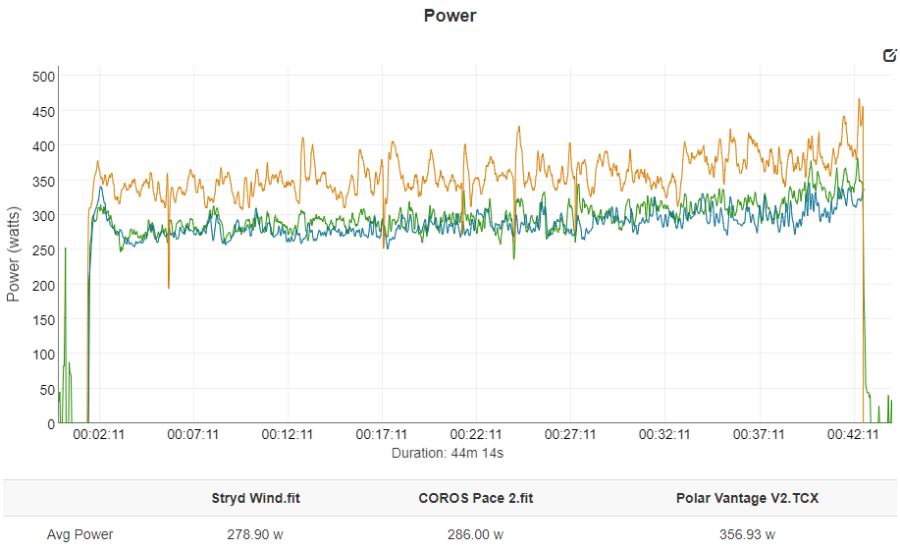
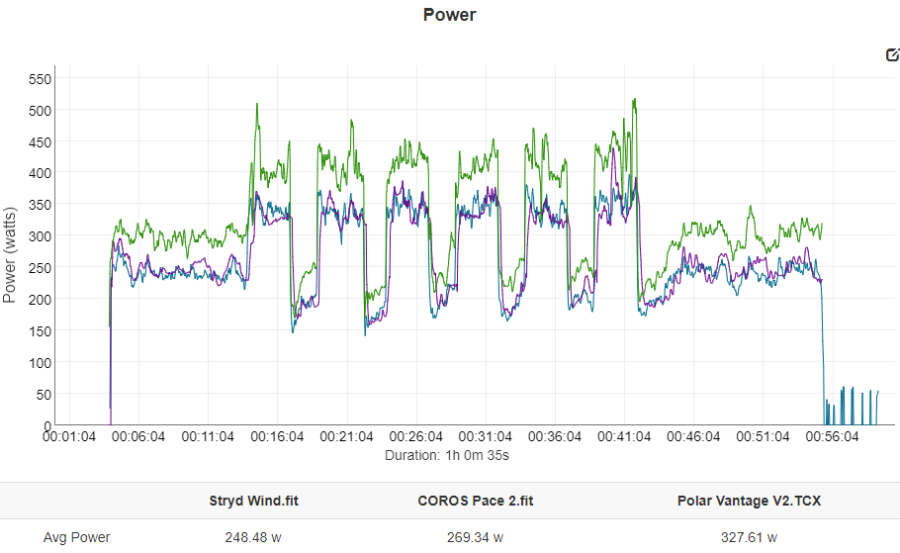 Shop Polar Vantage V2
Shop Polar Vantage V2
BEN: No issues to note with GPS accuracy. I had a couple of instances where the initial GPS lock seemed to have an error and wouldn’t lock. Going back to the main screen and trying again resulted in a very quick GPS lock. This isn’t a big deal, as it wasn’t a common occurrence. In most cases, it picked up the satellites very quickly. The overall distance measurements were consistently a hair shorter than the other watches. This may have been a result of the Vantage V2 being worn on my left wrist and my routes unintentionally included counterclockwise turnarounds. The differences were small though – about 1%. More details are below.
Topography: Bike Trail to Mississippi River
Watches used: Polar Vantage V2 (green), COROS Pace 2 (purple), Garmin 245 (orange)
This route is along a paved bike trail through lightly wooded areas and then out into more open space at the Mississippi River. No issues here.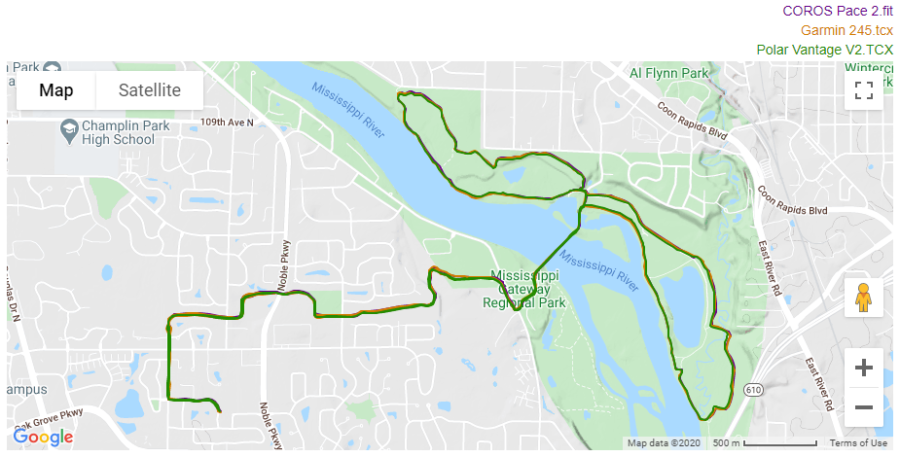
Close up of a wide-open area with minimal tree coverage. All GPS signals were right on track. Great results all around.
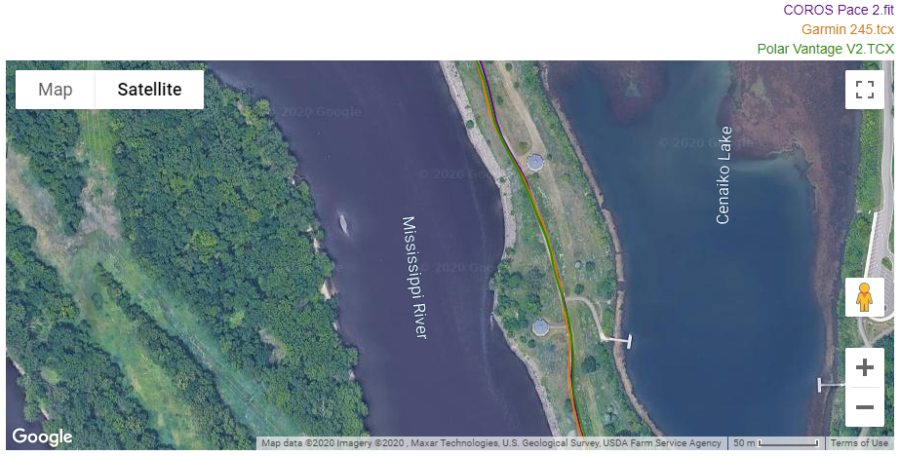
Close up of a more heavily wooded area included a tunnel. This includes out and back traces so there are 6 lines. Results are a little noisier, but no specific issues or concerns with any specific watch’s result
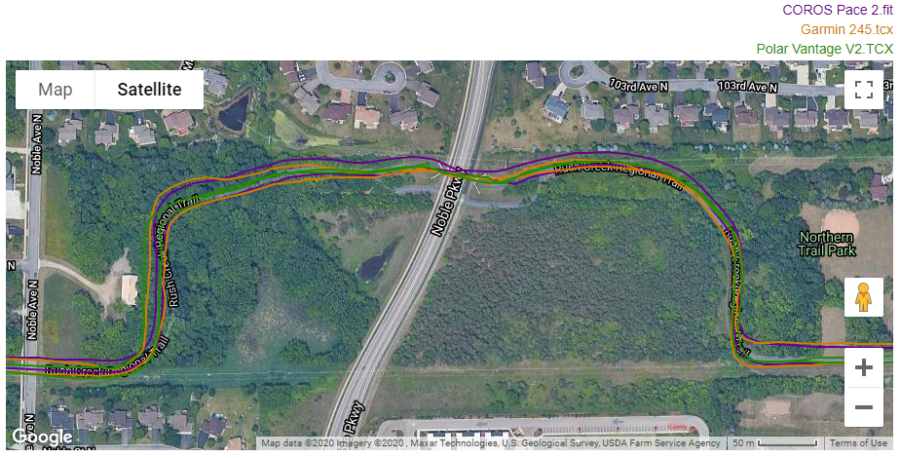
Topography: Bike Trail to Local Park
Watches used: Polar Vantage V2 (orange), COROS Pace 2 (blue), Garmin 245 (red)
This is another out and back route on a bike trail through a wooded area. There is tree coverage around most of this run.
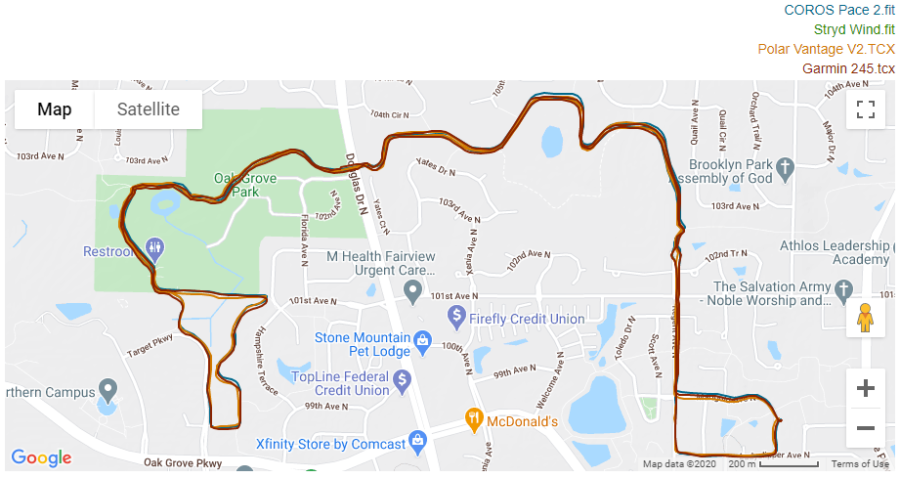
Close up of a loop that shows good tracking from all of the watches.
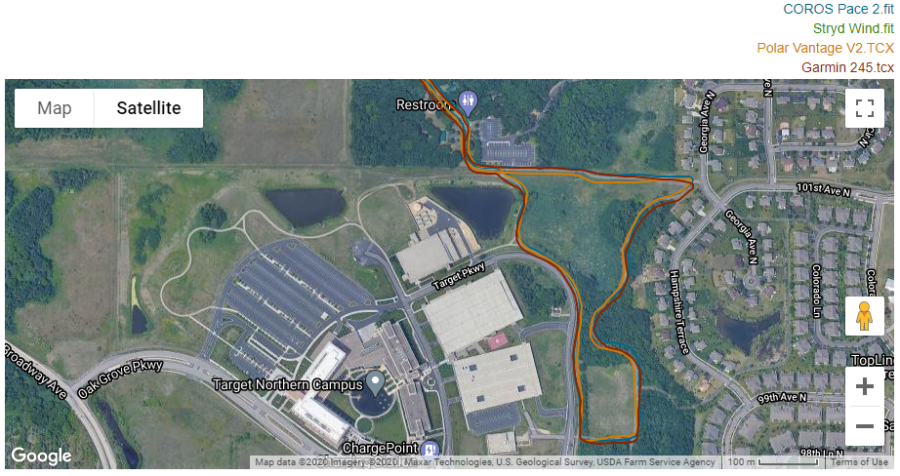
Close up of a more wooded area that has both out and back traces. Some deviation but generally seems to show where I ran on the right vs. left side of the trail. The Pace 2 swung out a little wide in some areas, but nothing of major concern.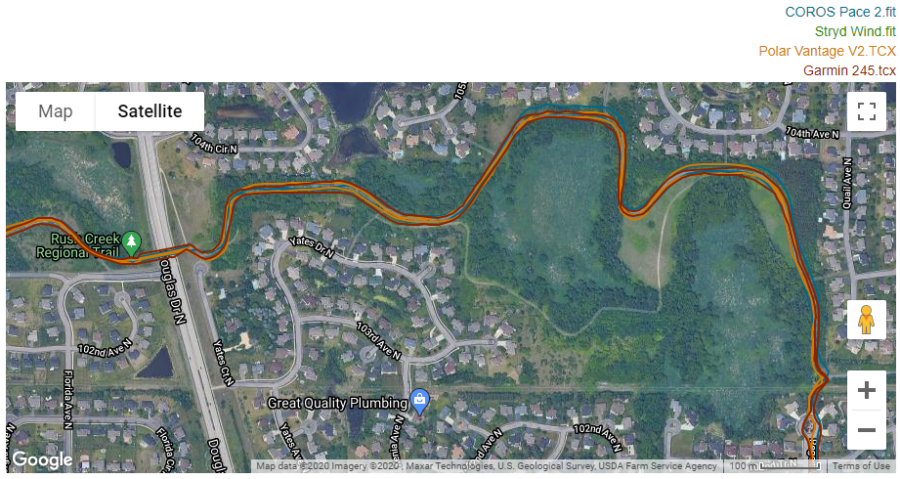
BEN: Polar updated the Vantage V2 to the LEDs used in the Grit X for heart rate tracking. I have found that wrist-based HR can be a challenge for any watch, but a lot of that is due to mounting. The watch must be fastened tight, and even then a bony wrist can cause issues as movements and arm twisting occurs. I found the Vantage V2 results were typical for a wrist-based HR monitor: good, but not great.
Watches used: Polar Vantage V2 (green), COROS Pace 2 (purple), Garmin 245 (orange), Polar H10 (blue)
This was a steady run with a few short stops to loosen my shoe. The HR tracked very well across all the devices. At the end of the run I did a few sets of short strides. A zoomed in view of this is shown below.
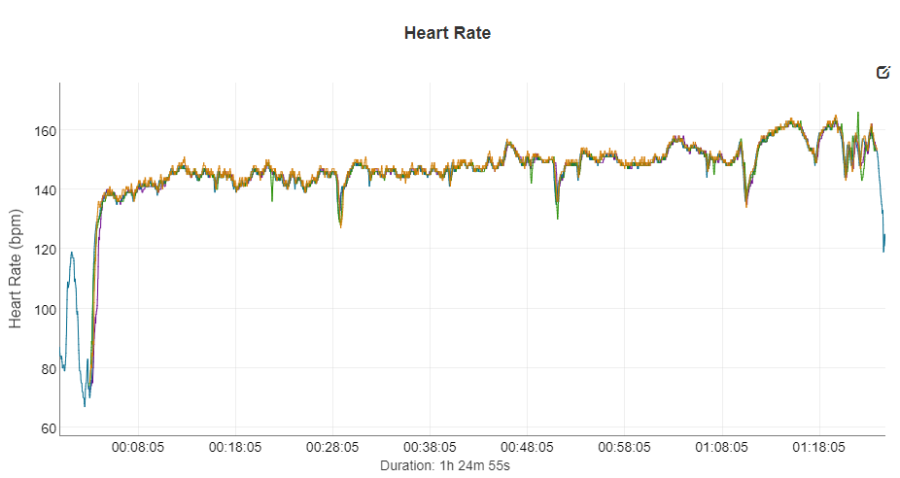
The last 5 minutes of the run included strides that take my HR up and down quickly. This is notoriously hard for wrist-based HR monitors to capture. Overall, the results were OK, but the Vantage V2 did spike and dip on one of the reps. Not terrible, but not on par with the Polar H10 HR strap which tracked perfectly.
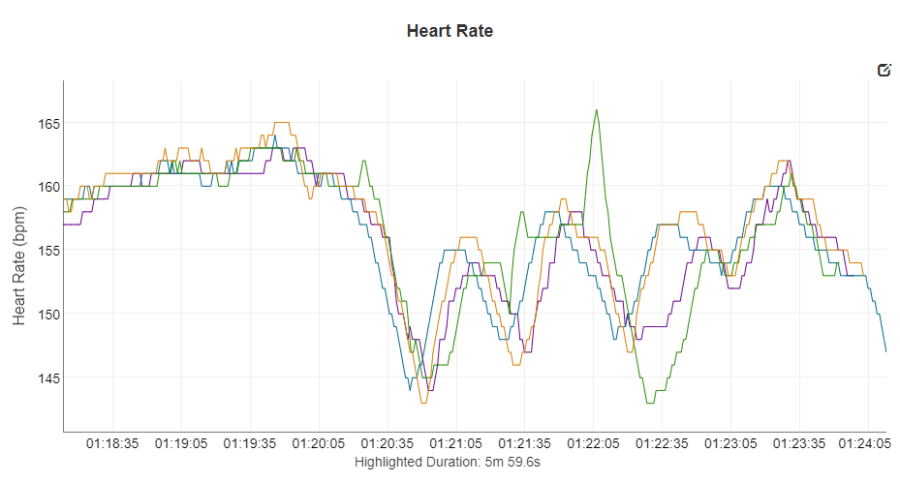 Shop Polar Vantage V2
Shop Polar Vantage V2
BEN: This is a pretty short list, but there are a few items of note. The first feature to call out is that the watch strap is not a universal 22mm. I got the M/L size and it’s the longest strap of any watch I own. If you have smaller wrists you probably want the size S strap. If it were a universal strap, I would have been able to easily swap out, but with this configuration, I don’t have that immediate option. However, this strap design lays quite nicely on the wrist. Without the typical swivel points, it angles well to minimize any protrusions. Even with the long strap it still fits and doesn’t cause any issues.
The other notable omissions are onboard music storage and payment options. While this is an extremely powerful multi-sport GPS watch, it’s still not quite on par with clubhouse leaders such as the Apple Watch. In the dedicated sports watch world, only Garmin is large enough to offer these features. I personally don’t use either feature, but for some users, this could be something to consider. The lack of onboard music storage is a bummer, but it’s a step in the right direction that music can be controlled from the Vantage V2, which is a first from Polar.
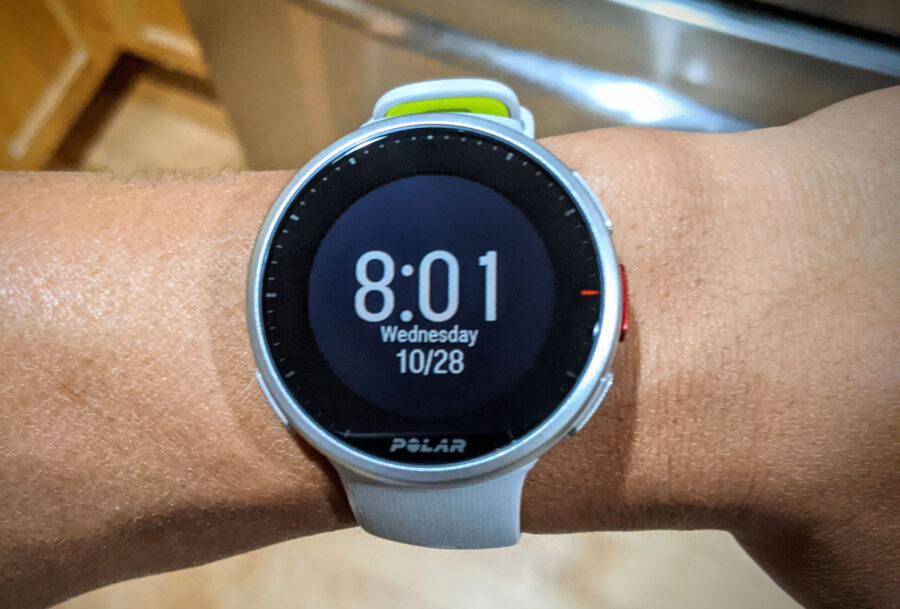
BEN: The Polar Vantage V2 is a relatively minor update to the Vantage V, but it makes some worthwhile changes. The cutting of weight is not insignificant, and always welcome. The different settings for GPS usage to maximize battery life can be game-changing for someone trying to stretch the effective time of activities, and the numerous additional features and tests provide useful insights into training progress. The watch I tested was a classy silver with a gray band and a hint of green on the underside. It looks less like a sports watch and more like a smartwatch. The touch screen worked well but the button interface can take a minute to get used to. Overall, it’s a good contender if you’re looking for a high-end GPS sports watch that’s a little cheaper, and a little lighter, than the top-end Garmin offerings.
You can pick up the Polar Vantage V2 using the shop link below.
Shop Polar Vantage V2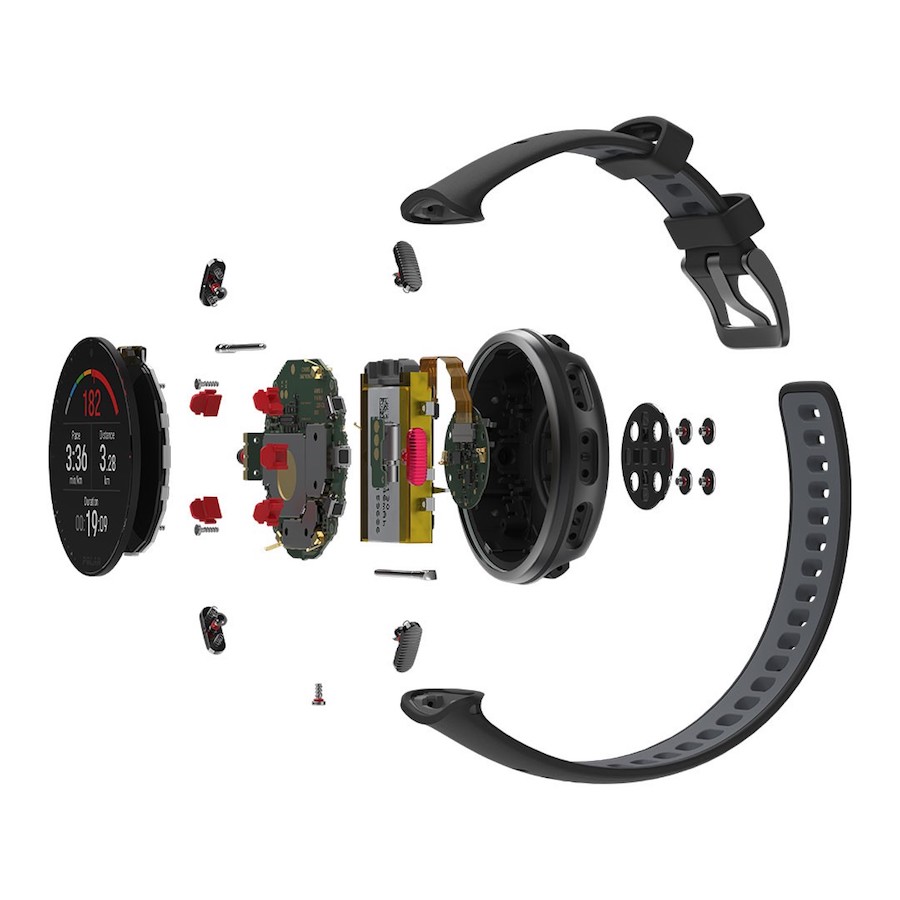
Photo courtesy of Polar
Have something to say? Leave a Comment
The v800 also had limited music controls, not much but it was the first Polar to have them. Skip, pause, and “like” as I recall (can check tomorrow on mine), during the first few seconds of a new track, and displays the title.